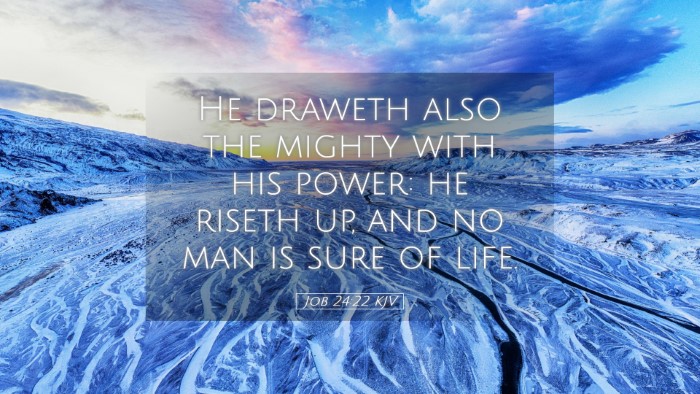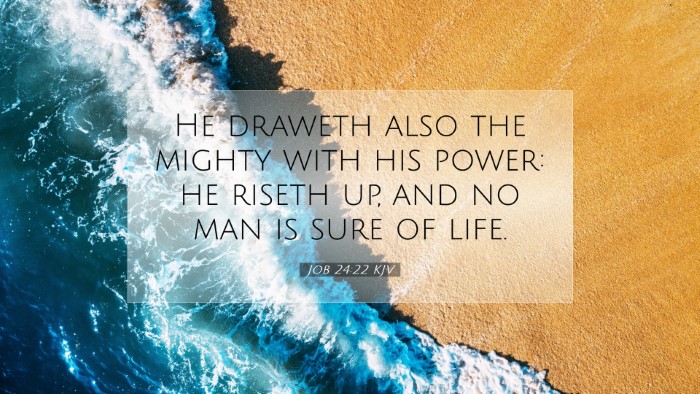Old Testament
Genesis Exodus Leviticus Numbers Deuteronomy Joshua Judges Ruth 1 Samuel 2 Samuel 1 Kings 2 Kings 1 Chronicles 2 Chronicles Ezra Nehemiah Esther Job Psalms Proverbs Ecclesiastes Song of Solomon Isaiah Jeremiah Lamentations Ezekiel Daniel Hosea Joel Amos Obadiah Jonah Micah Nahum Habakkuk Zephaniah Haggai Zechariah MalachiJob 24:22
Job 24:22 KJV
He draweth also the mighty with his power: he riseth up, and no man is sure of life.
Job 24:22 Bible Commentary
Commentary on Job 24:22
Verse (Job 24:22): "He draweth also the mighty with his power: he riseth up, and no man is sure of life."
Introduction
Job 24:22 encapsulates profound reflections on divine sovereignty and human frailty. This verse serves as a reminder of the omnipotence of God and the transitory nature of human existence. The insights from various public domain commentaries will illuminate the theological depths of this verse, offering valuable reflections for pastors, students, theologians, and Bible scholars.
Exegesis of Job 24:22
The phrase “He draweth also the mighty with his power” intimates God's dominion over even the most powerful individuals. The “mighty” can be interpreted as rulers or individuals of great influence who, despite their strength, are ultimately subject to God's will.
The second part of the verse, “he riseth up, and no man is sure of life,” conveys a sense of uncertainty and vulnerability inherent in human existence. This underscores the idea that regardless of one’s status or strength, life is fragile, and the ultimate authority rests with God.
Insights from Matthew Henry
Matthew Henry eloquently emphasizes the supremacy of God's power over humanity. He notes that even the greatest of men can be drawn down by God's mighty hand, signifying that human strength is insignificant in the face of divine authority. He elaborates that God intervenes in the affairs of men, making the strong fall while the weak are upheld.
Henry also points out the existential uncertainty in life: “no man is sure of life.” He argues that this reflects the larger theme within the Book of Job dealing with suffering, loss, and divine justice. The temporal nature of human existence is a recurring motif in biblical literature, reminding believers of human mortality.
Insights from Albert Barnes
Albert Barnes offers a theological perspective, interpreting the conditions under which the mighty are “drawn” to signify divine judgment. He discusses the implications of God’s power over life and death, suggesting that God's will is inscrutable and often beyond human understanding.
Barnes posits that the phrase “no man is sure of life” captures the essence of human vulnerability. Each day presents unforeseen challenges and uncertainties, and the realization of God’s sovereignty in these moments leads to a healthy fear of the Lord, which is the beginning of wisdom.
He stresses that life’s unpredictability should lead humanity to a place of humility and dependence on God, rather than arrogance or self-reliance.
Insights from Adam Clarke
Adam Clarke brings a contextual approach, arguing that Job 24:22 fits within a larger discourse on justice and the prosperity of the wicked. Clarke explains that Job is lamenting the apparent injustice of life, where the mighty flourish despite their unrighteousness.
Clarke elaborates that the divine pulling down of the powerful serves as an eventual reckoning, an assurance that no one can escape divine judgment. The verse serves as an exhortation to recognize God’s eternal authority amidst life's trials.
Emphasizing the second part of the verse, Clarke further notes that “no man is sure of life” illustrates the fragility of human existence, advocating for a deeper trust in God’s providential care as life unfolds unpredictably.
Theological Reflections
Job 24:22 provokes critical theological reflections about divine sovereignty, human agency, and the nature of suffering. The implications of God’s power over the mighty resonate through various historical and contemporary contexts. This verse challenges readers to grapple with their understanding of justice and righteousness, particularly when faced with the reality of evil prospering in the world.
Pastors can find in this passage a rich source for preaching on the themes of humility, dependence on God, and the assurance of ultimate justice. It encourages congregations to confront the uncertainties of life with faith and trust in God’s overarching plan.
Application for Contemporary Believers
In a world rife with power dynamics and moral ambiguity, the insights from Job 24:22 remind believers of their place in the created order. Understanding that God has authority over life and death invites humility and a reliance on divine wisdom in navigating life's challenges.
Moreover, this verse encourages believers to reflect on their own lives in light of eternity, prompting them to seek alignment with God's will rather than mere human ambitions. The reminder of life's unpredictability should lead to a greater appreciation of grace and mercy, motivating believers to live with purpose and intentionality.


